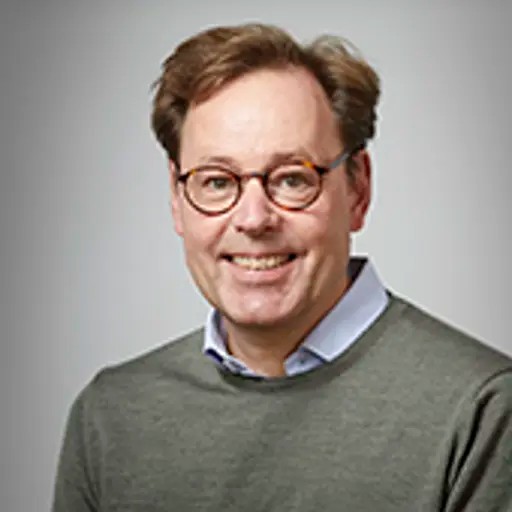
Catalysts are needed to trigger chemical reactions. We have all heard of catalytic converters in cars. However, catalysts have countless of uses in society, as well as many other parts of life. For Professor Henrik Grönbeck, the year he spent in Berlin completing his master’s degree in 1990 was a catalyst. As the Wall came down and Germany reunited, he started his research career.
“I participated in a research group that year, and when I realised that they were interested in what I was doing, it really fired me up. We were working on thermal conductivity in thin film layers, and developed a model that is still used today.”
After that year in Berlin, he became a doctoral student at Gothenburg University, which brought him to the world of catalysts. His enthusiasm is unmistakable as he describes the properties, trends and variations of atomically controlled metal clusters.
“It’s completely fascinating to comprehend things at the atomic level – the entire world is built of atoms and molecules. Physics is such a broad field. It’s almost too good to be true.”
Relaxing concentration with choral singing and sailing
And yet it takes more than quantum physics to make all of life’s catalysts work. Music, for example. Grönbeck starts each day by listening to music, he loves to go to concerts and has previously played guitar and sung in a choir.
“When you sing in a choir, you have your own part to think about, but you also have to listen to the others and follow their lead. That makes you a part of something bigger. The same thing is true of research. In fact, choral singing is actually a lot like research,” he says with a smile.
Those who pass by Grönbeck’s office know that the lights often are on. However, there are times when he abandons all thoughts of chemical physics, quantum mechanics and catalysis. Sailing is his favourite pastime – it all started with a course when he was 35.
“It was a whole new world to me, and it was so much fun learning something new. Sailing takes concentration, but it is relaxing concentration. It takes my mind off everything else. There is nothing but water, wind and the sails.”
The key to new, sustainable energy systems
His research is also about making better use of natural resources. With new, better catalysts, we might be able to eliminate harmful, acidic nitrogen oxides. Grönbeck hopes that in the future, catalysts will work even at very low temperatures. To achieve this, research needs to cross existing barriers – just as the reactions do.
Above all, however, he would like it to be possible to convert carbon dioxide (CO2) to methanol. That would eliminate something we don’t want and replace it with something we need.
“Catalysis is involved in so many parts of society. Catalysts are used to produce chemicals, to clean vehicle exhaust, and they’re going to be the key to new, sustainable energy systems. Many of the chemical processes are difficult to improve, but by maintaining and developing new knowledge, we can help society to develop.”
More about Henrik Grönbeck
Born: 1966 in Halmstad
Lives: By Järntorget in Gothenburg
Family: None of my own, but I have two older sisters and a twin brother with families, and my mother, who lives in Halmstad
Job: Professor of the Department of Physics at Chalmers University of Technology, Head of the chemical physics division
Career in brief: Finished upper-secondary school technical programme in 1985, then did civil service as a teacher assistant. He studied history of science and ideas and then physics at Lund University. Went on to study physics at Gothenburg University, with an exchange year as a master’s degree student in Berlin. Did his doctoral studies at Gothenburg University and then took a postdoctoral position at IBM Research division in Ruschlikon outside Zürich. When he came back to Sweden, he spent a few years as a systems engineer at Ericsson Microwave Systems before research brought him back to academia. In 2001 he became an Assistant Professor at Chalmers working at the Competence Centre for Catalysis. He has been at Chalmers since then, and in 2016 he became a Professor at the Department of Physics.
Leisure: Apart from spending time with friends, I enjoy sailing, running and music. I’ve played piano and guitar and sung in a choir. I listen to music every day and enjoy going to concerts. Ryan Adams, Ron Sexsmith and Gillian Welch are some of my favourites. Bob Dylan is my household god.
Favourite places for inspiration: The ocean. I have a boat in Björlanda Kile and I love being out and sailing and forgetting everything else.
Most proud of: That we solved the mystery of the atomic structure of stabilised gold. Understanding and being able to predict how atoms are arranged and how electrons are distributed opened the door to materials predictions.
Motivation: That feeling when you suddenly understand something that you didn’t before. That’s the best part.
First memory of physics: My dad taught maths and physics and my mum was a junior high school teacher, so I’ve always had things explained to me well. I suppose that gave me a built-in scientific approach.
Best thing about being a scientist: Everything! I pretty much only do fun things: Research, calculations, teaching, organisation, presentations, articles, summaries, various kinds of collaborations with other researchers and companies… All of it is fun. Plus I have a lot of control over my work.
Challenges of the job: Scientific problems are SUPPOSED to be difficult, so it’s hard to come up with anything negative. Maybe that it takes a long time to get new research projects off the ground, because you can’t hire anyone until you get funding for a project.
Dream for the future: Imagine if we could transform carbon dioxide into methanol. Then we’d have a base chemical for further refinement and a liquid fuel that isn’t fossil-based.
Contact

- Full Professor, Chemical Physics, Physics